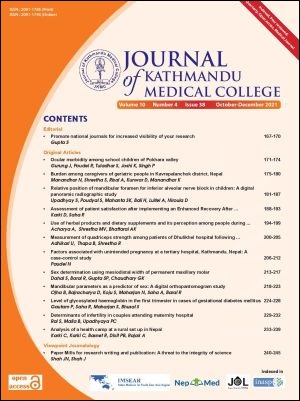Assessment of patient satisfaction after implementing an Enhanced Recovery After Surgery (ERAS) protocol for elective Caesarean sections
DOI:
https://doi.org/10.3126/jkmc.v10i4.43859Keywords:
Cesarean section, Elective surgery, Enhanced recovery after surgery, Patient satisfactionAbstract
Background: Enhanced Recovery After Surgery (ERAS) is a multimodal patient centred perioperative care pathway aimed at accelerating patient recovery, improving patient satisfaction, decreasing length of hospital stay, and post-operative complications.
Objectives: To assess patient satisfaction with ERAS protocol in the most common surgical procedure in the world, elective Caesarean Section.
Methods: A descriptive cross-sectional study was carried out in the department of Obstetrics and Gynaecology at Kathmandu Medical College Teaching Hospital (KMCTH) from July 2020 to February 2021 after ethical approval. The study included all pregnant ladies undergoing elective Caesarean section under ERAS protocol by convenient sampling and their satisfaction with the treatment received was recorded using a pre-validated questionnaire at the time of discharge. Data was analysed using SPSS.
Results: A total of 140 patients were enrolled in the study. Majority of the patients considered the introduction of feeding (100, 71.4%) and ambulation (115, 82.1%) to be on time. Seventy-three patients (52.1%) considered themselves fit for discharge on the second post-operative day and 70 (50%) were discharged on the second post-operative day itself which is earlier compared to the hospital protocol of discharge on the third or fifth post-operative day. Most of the women (136, 97.1%) were satisfied with the care they received and 132 (94.3%) of them would prefer to undergo surgery under the ERAS protocol in the future.
Conclusion: Most women were satisfied with the surgical experience and would prefer to undergo surgery under the same protocol in the future.
Downloads
Downloads
Published
How to Cite
Issue
Section
License
Copyright © Journal of Kathmandu Medical College
The ideas and opinions expressed by authors or articles summarized, quoted, or published in full text in this journal represent only the opinions of the authors and do not necessarily reflect the official policy of Journal of Kathmandu Medical College or the institute with which the author(s) is/are affiliated, unless so specified.
Authors convey all copyright ownership, including any and all rights incidental thereto, exclusively to JKMC, in the event that such work is published by JKMC. JKMC shall own the work, including 1) copyright; 2) the right to grant permission to republish the article in whole or in part, with or without fee; 3) the right to produce preprints or reprints and translate into languages other than English for sale or free distribution; and 4) the right to republish the work in a collection of articles in any other mechanical or electronic format.




